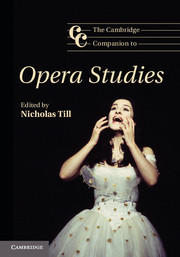Book contents
- Frontmatter
- Contents
- Contributors
- Acknowledgements
- Introduction: opera studies today
- Part One Institutions
- Part Two Constituents
- Part Three Forms
- Part Four Issues
- 11 Opera and gender studies
- 12 Opera and national identity
- 13 ‘An exotic and irrational entertainment’: opera and our others; opera as other
- Further reading
- Index
- References
12 - Opera and national identity
from Part Four - Issues
Published online by Cambridge University Press: 05 December 2012
- Frontmatter
- Contents
- Contributors
- Acknowledgements
- Introduction: opera studies today
- Part One Institutions
- Part Two Constituents
- Part Three Forms
- Part Four Issues
- 11 Opera and gender studies
- 12 Opera and national identity
- 13 ‘An exotic and irrational entertainment’: opera and our others; opera as other
- Further reading
- Index
- References
Summary
It might seem curious to the average modern music lover that opera, that most elite of genres, came to be seen as music’s pre-eminent contributor to nationalism. This apparent contradiction derives, however, from two common misconceptions: on the one hand, that nationalism was essentially an expression of popular (nineteenth-century) revolt; on the other, that opera’s associations with the aristocracy should debar it from relevance to more general political concerns. Such misconceptions might seem appropriate for an ideology such as nationalism, which has always covered the traces of its invention by rewriting history in its own image, but opera too is defined by its continual reinvention of itself.
Indeed, as both opera and nationalism are at heart concerned with origins and with representing themselves as originary – both defining themselves as ‘always already’, whether in theoretical or dramatic terms – their interaction can be symbiotic. The anxiety perpetually expressed in operatic criticism and theory about ‘naturalness’ (generic, vocal, aesthetic) is thus neatly complemented by nationalist ideology, the prime hegemonic strategy of which has been similarly to self-authenticate as inherent and instinctive. It is only in the latter part of the twentieth century that nationalism has been subject to stringent scrutiny as an ideology, its essentialist claims unpicked as historically contingent on (variously) incipient capitalism, industrialization, mass communication and the decline of religion. Scholars such as Ernest Gellner, Benedict Anderson, Eric Hobsbawm and Liah Greenfield have seen nationalism as an invention of the modern period (from c.1800 onwards), and have offered trenchant critiques of the ideology’s essentialist mystification. Nonetheless, with nation states remaining powerful political and cultural forces (despite the effects of globalization) and the right to national self-determination still invoked in pursuit of new political entities, the idea of the nation continues to be a significant social paradigm – and continues to be the principal way we parcel up history, whether operatic or otherwise.
- Type
- Chapter
- Information
- The Cambridge Companion to Opera Studies , pp. 276 - 297Publisher: Cambridge University PressPrint publication year: 2012

